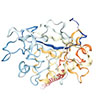| Jan 13, 2022 |
|
(Nanowerk News) A couple of essential biomolecules play a key role in the process of blood clotting. One of these is a protein called fibrinogen. It is often given to those who have experienced heavy bleeding, like trauma patients. But the fibrinogen concentrate that can be given to a patient is crude and involves a complicated purification process to be free of impurities and disease-causing organisms.
|
|
Addressing the need for better manufacturing processes, researchers from China and California developed a way to capture human fibrinogen from blood plasma. Kenneth J. Shea from the University of California, who is a corresponding author on this project, explains: “We engineered a novel polymeric nanoparticle that can act as a protein affinity reagent, with selective affinity for human fibrinogen”.
|
|
In their paper in the Journal of Pharmaceutical Analysis (“Engineered polymer nanoparticles incorporating l-amino acid groups as affinity reagents for fibrinogen”), they describe how the nanoparticles were made using temperature-sensitive N-isopropyl acrylamide (NIPAm) and L-amino acid monomers.
|
|
Quanhong Zhu from Southern Medical University, China, who is also a corresponding author for the article, tells us: “The polymerized forms of amino acids have great protein binding affinity, so by adjusting the formulation of a hydrogel by introducing these polymers, we can increase its protein binding affinity”.
|
|
The researchers obtained functional monomers from five kinds of L-amino acids: L-phenylalanine (Phe) and L-leucine (Leu) with hydrophobic side chains, L-glutamic acid (Glu) with negative charges, and L-lysine (Lys) and L-arginine (Arg) with positive charges. Of these, the nanoparticles that incorporated N-acryloyl-Arg monomers ([email protected]) showed the strongest and most specific binding affinity to fibrinogen after incubation.
|
|
The team’s findings could fuel further research and development of [email protected] as a fibrinogen-specific affinity reagent that could be used for drug manufacture. You can feel Zhu’s excitement as he elaborates: “Our nanoparticles form non-biological protein affinity reagents, which are more robust and economic to manufacture than biological reagents. They have been specifically synthesized to bind to fibrinogen, and hence are also more efficient because they have greater binding capacity”.
|
|
Fibrinogen concentrate can be quickly and safely given to patients in need, without the need for cross-matching. Its use in emergency medicine is undebatable. Now, the introduction of this synthetic, ‘tailor-made’ reagent results in a simpler and less expensive way to manufacture fibrinogen concentrate, making it affordable and saving more lives.
|

